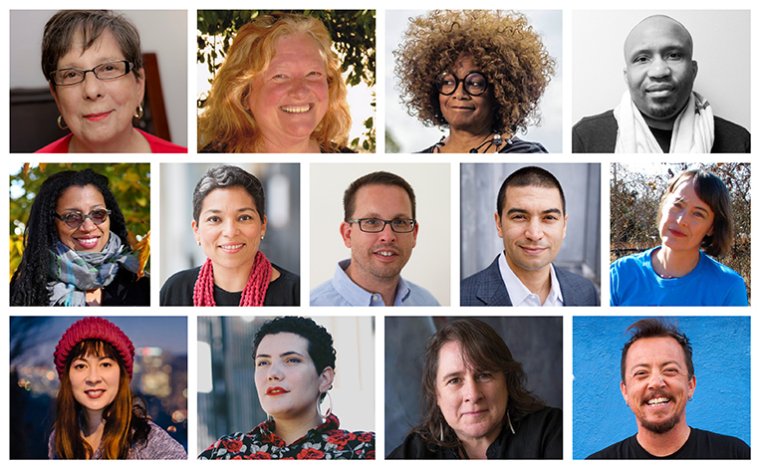Today the Academy of American Poets announced the thirteen recipients of its inaugural Poets Laureate Fellowships. The Academy will distribute more than $1 million to poets laureate of states, cities, and counties across the United States to organize poetry programs in their communities during the next year. “Poets have an important role in our culture and in communities all across the country,” said Michael Jacobs, the chair of the Academy, in a press release. “By supporting poets laureate at the state and local level, we hope to ensure that more people become acquainted with poets and poetry where they live and have an opportunity to benefit from innovative and groundbreaking programming close to home.”

Recipients of the inaugural Poets Laureate Fellowships from the Academy of American Poets. Top row, from left: Grace Cavalieri, Molly Fisk, Jaki Shelton Green, and Fred L. Joiner. Middle row: Robin Coste Lewis, Claudia Castro Luna, Ed Madden, Adrian Matejka, and Jeanetta Calhoun Mish. Bottom row: Paisley Rekdal, Raquel Salas Rivera, Kim Shuck, and TC Tolbert.
The grants, which range from $50,000 to $100,000, will enable poets to address the specific needs of their communities. Several recipients will host workshops in their areas: TC Tolbert, the poet laureate of Tucson, plans to conduct workshops with trans, nonbinary, and queer groups; Jeanetta Calhoun Mish, the poet laureate of Oklahoma, plans to run workshops for students in public schools in undeserved communities and rural areas; and Fred L. Joiner, the poet laureate of Carrboro, North Carolina, will host writing workshops and start a salon in the city. In Philadelphia, Raquel Salas Rivera will organize a poetry festival and community workshops, and in San Francisco, Kim Shuck will create a seed program to help other poets build literary community in different parts of the city.
Molly Fisk and Claudia Castro Luna will establish programs that address the landscape and natural resources of their regions. Fisk, the poet laureate of Nevada County in California, will launch “California Fire & Water,” a “statewide teaching, anthology, and public reading project addressing the recent devastating fires in the state.” Luna, the poet laureate of Washington State, proposes to host a series of workshops and readings along the Columbia River to highlight its importance as a natural resource.
A couple of the recipients will launch projects that focus more squarely on activism. North Carolina poet laureate Jaki Shelton Green will establish a program to support youth poets who are engaged artistically in social justice and civic and community activism, while Los Angeles poet laureate Robin Coste Lewis will conduct a “yearlong experiment in redress, a series of programs (reading and conversations) that use the poetry from various L.A. histories/communities to engage the process of cultural, political, and historical reconciliation.”
Other poets will archive and celebrate the literary history of their communities, among other initiatives. Utah poet laureate Paisley Rekdal will create the website “Mapping Literary Utah,” which includes videos, poems, and prose excerpts by Utah writers, and Ed Madden, the poet laureate of Columbia, South Carolina, will create an interactive story map of the city. Adrian Matejka will launch a digital archive of Indiana’s poetry, and Grace Cavalieri will produce a podcast and monthly newspaper column featuring Maryland poets.
The recipients were selected by a panel made up of three former U.S. poets laureate—Juan Felipe Herrera, Robert Pinsky, and Natasha Trethewey—as well as Olivia Morgan, the founder of the National Student Poets Program; poets Natalie Diaz and Mark Nowak; former Academy board chair Eunice Panetta; and Academy executive director Jennifer Benka. The Andrew W. Mellon Foundation, which is led by the poet and memoirist Elizabeth Alexander, funded the program in January 2019.
The winning poets’ proposals highlight the many ways poetry can build community. “Poets make immeasurable contributions,” says Benka. “Their poems spark conversation and can help us learn about one another’s lives and unique experiences, which promotes greater understanding. We’re honored to help underwrite these poets, all of whom are exceptional leaders.”







